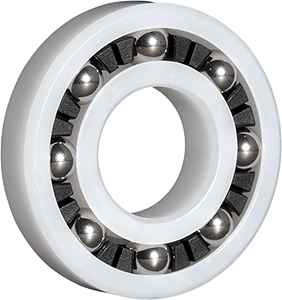Plastic Ball Bearings
Standard Tolerances

Tolerances for Mounting and Interference Fits
|
INNER DIAMETER |
||
|
MINIMUM |
MAXIMUM |
GENERAL TOLERANCE |
|
0.000" |
0.749" |
+.003", -.0" |
|
0.750" |
1.250" |
+.004", -.0" |
|
WIDTH |
|
|
MAXIMUM |
GENERAL TOLERANCE |
|
3.000" |
+/- .005" |
|
4.000" |
+/- .008" |
|
5.000" |
+/- .010" |
|
DIAMETRIC CLEARANCE "radial play" |
||
|
BORE |
OUTSIDE |
GENERAL |
|
0.187" |
1.000" |
free turning to .008" |
|
0.500" |
1.625" |
free turning to .009" |
|
0.750" |
2.000" |
free turning to .010" |
|
1.250" |
3.000" |
free turning to .012" |
|
OUTSIDE DIAMETER |
||
|
MINIMUM |
MAXIMUM |
GENERAL |
|
0.000" |
1.000" |
+.0", -.003" |
|
1.001" |
1.625" |
+.0", -.004" |
|
1.626" |
2.000" |
+.0", -.005" |
|
2.001" |
3.000" |
+.0", -.006" |
* Tolerances for double row construction, consult KMS Bearings engineering.
MOUNTING PRACTICE
PLASTIC RING CHARACTERISTICS
Plastic will expand and contract in proportion to the amount of interference pressure. Any press fit to the rings will reduce the diametric clearance in proportion to the amount of the interference fit. The maximum amount for overall interference fit for general practice should not exceed 1/2 of the nominal radial play dimension.
INTERFERENCE FITS
A typical application would be a press fit to one ring and a slip fit to the other. Using the above criteria, a bearing with .008" radial play would allow you to apply a maximum of .003" press fit to one ring and maximum of .001" slip fit the other. It is recommended that the customer measure the actual bearing to be used for calculating shaft and housing fits.
NOTE: These are general manufacturing tolerances. They may vary depending on material type and bearing design.
For tolerances on diameters larger than listed above, please contact KMS for engineering data and availability.
Temperature Range for Plastic Ball Bearings
Recommended maximum service temperature in air for Plastic Raceways.
|
Materials |
°F/°C |
|
Celcon® Acetal |
180/82 |
|
Kynar® (PVDF) |
183/84 |
|
PEEK |
338/170 |
|
Valox®PBT Polyester |
158/70 |
|
Polypropylene |
140/60 |
|
UHMW-PE |
130/55 |
|
Zytel® Nylon 612 |
181/83 |
|
Polysulfone |
329/165 |
|
Minlon® |
400/204 |
Minlon® is registered trade mark of the Dupont Corporation.
Zytel® is registered trade mark of the Dupont Corporation.
Torlon® is registered trade mark of the Solvay Advanced Polymers.
Kynar® is a registered trade mark of the Autochem Corporation.
Celcon® is a registered trade mark of Celanese Corporation.
* This chart is for reference only. KMS recommends testing in actual environment to be encountered. Information presented is believed to be accurate at the time of publication and is subject to change without notice.
No warranty, either expressed or implied is given regarding the accuracy of this information. The user assumes all risk and liability in connection with the use of KMS information.
Chemical Compatibility
|
|
ACETAL |
KYNAR® |
PEEK |
VALOX® |
POLYPRO- |
UHMW- |
NYLON 612 |
Polysulfone (PSU) |
Minlon® |
|
ACIDS WEAK |
L |
A |
A |
A |
A |
A |
A |
A |
A |
|
ACIDS STRONG |
U |
A |
L |
L |
A |
L |
U |
L |
U |
|
|
|
|
|
|
|
|
|
|
|
|
ALKALIES, |
L |
A |
A |
L |
A |
A |
A |
A |
A |
|
ALKALIES, |
U |
L |
A |
A |
A |
A |
A |
A |
A |
|
|
|
|
|
|
|
|
|
|
|
|
HYDROCARBONS |
A |
A |
A |
L |
A |
L |
A |
A |
A |
|
|
|
|
|
|
|
|
|
|
|
|
KETONES |
A |
U |
A |
L |
A |
A |
A |
U |
A |
|
|
|
|
|
|
|
|
|
|
|
|
ETHERS |
A |
A |
- |
- |
- |
A |
A |
U |
A |
|
|
|
|
|
|
|
|
|
|
|
|
ESTERS |
A |
A |
A |
A |
L |
A |
A |
U |
A |
|
|
|
|
|
|
|
|
|
|
|
|
ALCOHOLS |
A |
L |
- |
L |
A |
A |
A |
A |
A |
A = ACCEPTABLE
L = LIMITED
U = UNACCEPTABLE
- = NO RATING
* This chart is for reference only. It is a snapshot comparison reference. KMS recommends testing in your actual environment to be encountered. Information presented is believed to be accurate at the time of publication and is subject to change without notice.
For additional information on the materials available please go to PDF Library.
No warranty, either expressed or implied is given regarding the accuracy of this information. The user assumes all risk and liability in connection with the use of KMS information.

